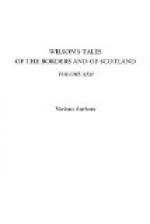I have only now to add, that I had frequent opportunities of seeing both Lindsay and his wife after the establishment of my innocence, and that no persons would more sincerely rejoice in that event than they did. My poor mother, whom my father had made aware of my situation soon after my arrival, and who had borne the intelligence much better than we expected, it put nearly distracted with joy.
“My puir laddie,” she exclaimed, “I aye kent to be innocent. But noo the world ’ll ken it too, and I can die happy.”
THE AMATEUR ROBBERY.
If there is anything more than another of which civilisation has reason to be proud, it is the amelioration that has been effected in punishment for crimes. Nor is it yet very long since we began to get quit of the shame of our folly and inhumanity, if we have not traces of these yet, coming out like sympathetic ink dried by the choler of self-perfection and a false philosophy, as in such writings as the latter-day pamphlets. How a man who loves his species, and has a heart, will hang his head abashed as he turns his vision back no further than the sixteenth century, and sees the writhing creatures—often aged unhappy women—under the pilniewinkies, caschielaws, turkases, thumbikens, and other instruments of torture, frantically bursting out with the demanded confession that was to fit them for the stake or the rope! And even after these things in the curiosity shop of Nemesis were got rid of, the abettors of the law rushed with full swing into the operation of hanging, scarcely allowing a crime to escape, from cold-blooded murder down to the act of the famished wretch who snatched a roll from a baker’s basket. However insensible these strange lawgivers may have been to so much cruelty, however blind to the perversity, prejudices, and weaknesses incident to human testimony, however ignorant of the total inefficacy of their remedy to deter from crime, one might have imagined that they could not but have known, if they ever looked inwardly into their own hearts, how obscure are human motives, and especially those that instigate to breaches of the law; and yet their consistent rule was, to make the corpus delicti prove the intention. These considerations have been suggested to me by the recollection of a wild adventure of some young men in Edinburgh, the circumstances of which, not belonging to fiction, will show better than a learned dissertation how easy it was for these Dracos to catch the fact and miss the motive.
The skeleton names—now, alas! the only representatives of skeleton bodies—Andrew W——pe, Henry S——k, and Charles S——th, may recall to the memory of some people in Edinburgh still, three young men, who, with good education, fair talents, and graces from nature, might have played a respectable role in the drama of life, had it not been for a tendency to “fastness,” a disease which seems to increase with civilisation. In their




